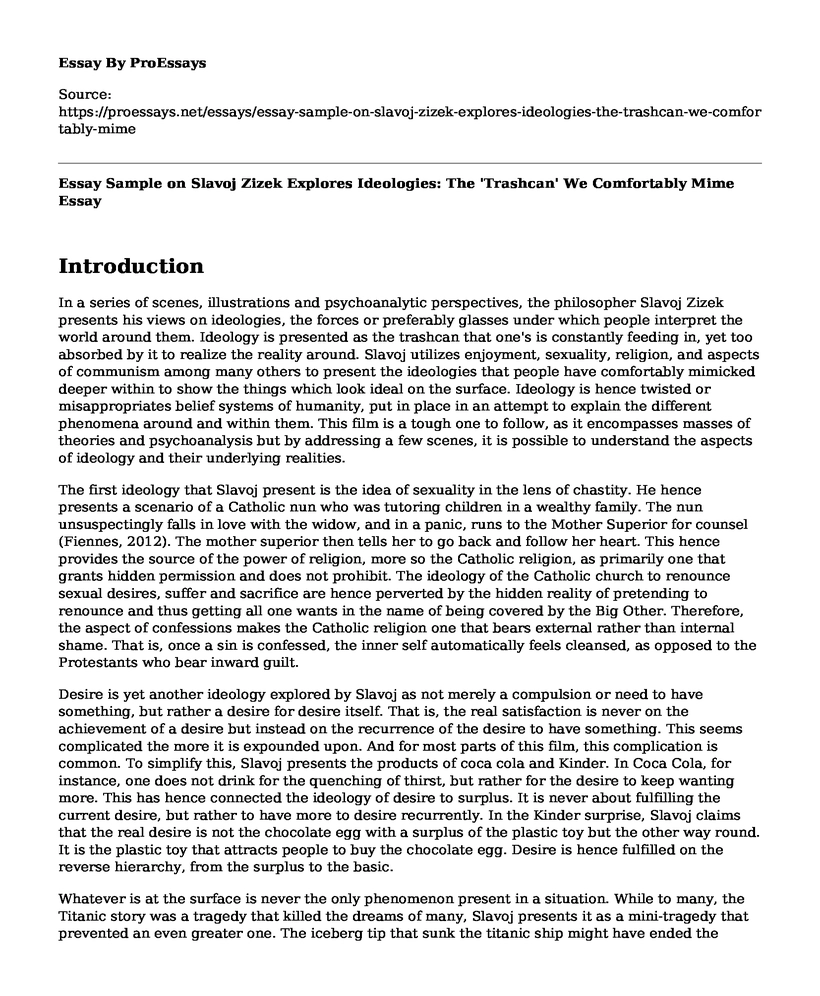Introduction
In a series of scenes, illustrations and psychoanalytic perspectives, the philosopher Slavoj Zizek presents his views on ideologies, the forces or preferably glasses under which people interpret the world around them. Ideology is presented as the trashcan that one's is constantly feeding in, yet too absorbed by it to realize the reality around. Slavoj utilizes enjoyment, sexuality, religion, and aspects of communism among many others to present the ideologies that people have comfortably mimicked deeper within to show the things which look ideal on the surface. Ideology is hence twisted or misappropriates belief systems of humanity, put in place in an attempt to explain the different phenomena around and within them. This film is a tough one to follow, as it encompasses masses of theories and psychoanalysis but by addressing a few scenes, it is possible to understand the aspects of ideology and their underlying realities.
The first ideology that Slavoj present is the idea of sexuality in the lens of chastity. He hence presents a scenario of a Catholic nun who was tutoring children in a wealthy family. The nun unsuspectingly falls in love with the widow, and in a panic, runs to the Mother Superior for counsel (Fiennes, 2012). The mother superior then tells her to go back and follow her heart. This hence provides the source of the power of religion, more so the Catholic religion, as primarily one that grants hidden permission and does not prohibit. The ideology of the Catholic church to renounce sexual desires, suffer and sacrifice are hence perverted by the hidden reality of pretending to renounce and thus getting all one wants in the name of being covered by the Big Other. Therefore, the aspect of confessions makes the Catholic religion one that bears external rather than internal shame. That is, once a sin is confessed, the inner self automatically feels cleansed, as opposed to the Protestants who bear inward guilt.
Desire is yet another ideology explored by Slavoj as not merely a compulsion or need to have something, but rather a desire for desire itself. That is, the real satisfaction is never on the achievement of a desire but instead on the recurrence of the desire to have something. This seems complicated the more it is expounded upon. And for most parts of this film, this complication is common. To simplify this, Slavoj presents the products of coca cola and Kinder. In Coca Cola, for instance, one does not drink for the quenching of thirst, but rather for the desire to keep wanting more. This has hence connected the ideology of desire to surplus. It is never about fulfilling the current desire, but rather to have more to desire recurrently. In the Kinder surprise, Slavoj claims that the real desire is not the chocolate egg with a surplus of the plastic toy but the other way round. It is the plastic toy that attracts people to buy the chocolate egg. Desire is hence fulfilled on the reverse hierarchy, from the surplus to the basic.
Whatever is at the surface is never the only phenomenon present in a situation. While to many, the Titanic story was a tragedy that killed the dreams of many, Slavoj presents it as a mini-tragedy that prevented an even greater one. The iceberg tip that sunk the titanic ship might have ended the beginning of something magical between jack and rose, but it also averted the painful dissolution of their relationship since they were from entirely different worlds.
Watching this film at first was like bombarding the mind with tones of philosophies, counterarguments and conspiracy theories that look and sound prevented at the surface as well as in the core. However, a second shot at the film proved the most philosophically rich and psychoanalytically endowed pieces of ideologies, split, rejoined and differentiated for what they are. While many phenomena and situations are often perceived with the flawed human interpretations, the inner ideologies are as far reached. Slavoj was successful in subverting the norms and ideals of many societies and individuals and unmasking the real intentions, desires, and circumstances surrounding a phenomenon.
References
Fiennes S. (2012). The pervert's guide to ideology. P Guide Productions. Zeitgeist Films. Retrieved from https://www.google.com/search?q=the+pervert+guide+to+ideology+film&oq=the+pervert+guide+to+ideology+film&aqs=chrome..69i57j0l3.11688j0j7&sourceid=chrome&ie=UTF-8"
Cite this page
Essay Sample on Slavoj Zizek Explores Ideologies: The 'Trashcan' We Comfortably Mime. (2023, Jan 11). Retrieved from https://proessays.net/essays/essay-sample-on-slavoj-zizek-explores-ideologies-the-trashcan-we-comfortably-mime
If you are the original author of this essay and no longer wish to have it published on the ProEssays website, please click below to request its removal:
- Collaboration Leadership in Development of a Mental Health Care Agency
- Essay Sample on Mental Health Laws
- Security and Domestic Terrorism Paper Example
- The Impacts of Immigration on Families and Children Paper Example
- Case Study: Ethical Consultation
- Essay Example on Anthony Quinton's Concept: Personality, Identity, and Memory
- Essay Example on Recovered Memories: Distinguishing Truth from False







